人教新起点 六年级英语下册知识点汇总
人教新起点英语六年级下册Unit6知识点汇总

新起点(一起)六年级下册Unit6 知识汇总一、单元词汇English-Chinese dictionary 英汉词典shopping centre 购物中心shopping mall 大型综合商业中心amazing 惊人的;神奇的hot pot 火锅二、单元句型(一)暑假计划The summer vacation is coming. 暑假要到了。
Tina and Jenny are going to London with the school dancing club. 蒂娜和珍妮要跟随学校的舞蹈社去伦敦。
They are going there by plane on July 15.他们将在七月十五日坐飞机去那里。
She is going to stay with her grandparents in Washington D.C. for a week. 她要和祖父母在华盛顿住一周。
They want to see Big Ben and visit the British Museum in London. 他们想在伦敦看大本钟并参观英国博物馆。
She also wants to go to some of the museums in Washington D.C. 她还想去华盛顿的一些博物馆。
(二)假期生活Bill s family took me to Xidan today. 比尔一家今天带我去了西单。
Bill s father bought some books for me. He bought two English books about China and one English-Chinese dictionary. 比尔的爸爸给我买了一些书。
他买了两本关于中国的书和一本英汉字典。
First I bought a lovely toy panda for my cousin.首先我给表妹买了一只可爱的玩具熊猫。
新人教版小学英语六年级下册各单元重点考点总结
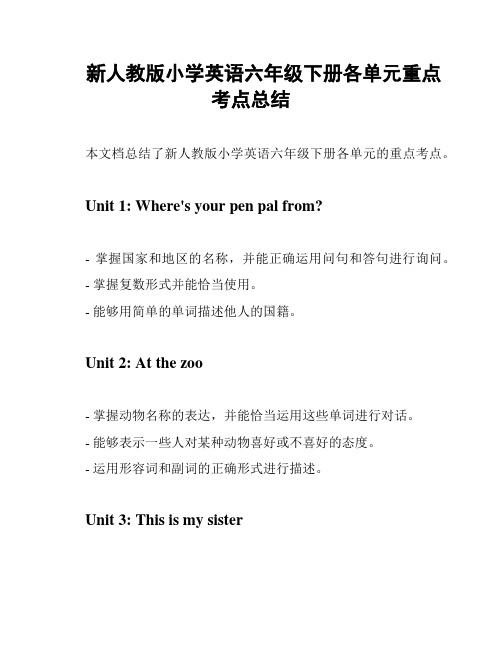
新人教版小学英语六年级下册各单元重点考点总结本文档总结了新人教版小学英语六年级下册各单元的重点考点。
Unit 1: Where's your pen pal from?- 掌握国家和地区的名称,并能正确运用问句和答句进行询问。
- 掌握复数形式并能恰当使用。
- 能够用简单的单词描述他人的国籍。
Unit 2: At the zoo- 掌握动物名称的表达,并能恰当运用这些单词进行对话。
- 能够表示一些人对某种动物喜好或不喜好的态度。
- 运用形容词和副词的正确形式进行描述。
Unit 3: This is my sister- 掌握表示家庭成员关系的词汇,并能在合适的情境下熟练使用。
- 能够用简单的句子表达自己和他人的家庭成员状况。
- 掌握疑问句和肯定/否定回答的语法结构。
Unit 4:What do you usually do on weekend?- 掌握表示日常活动和娱乐爱好的名词和动词,并能在合适的情境下熟练使用。
- 能够描述周末的计划,并能够用适当的时态表达过去、现在和未来的时间。
- 学会以礼貌的方式询问和回答他人的问题。
Unit 5: What's the matter?- 能够描述自己的身体不适,并能运用一些常用的疾病词汇。
- 掌握表示询问、建议和回答的用语,并能在合适的情境下使用。
- 学会表示关心和病愈等祝福的表达方式。
Unit 6: It's raining- 学会用简单的句子描述天气情况,并能表达对不同天气的态度。
- 掌握天气形容词的表达方式。
- 能够描述不同季节的气温、天气和风景。
总之,在学习小学英语六年级下册的过程中,应注重关注以上重点考点,并在实际中多进行运用练习,以此提高英语水平。
新起点六年级下册+Unit5+知识汇总
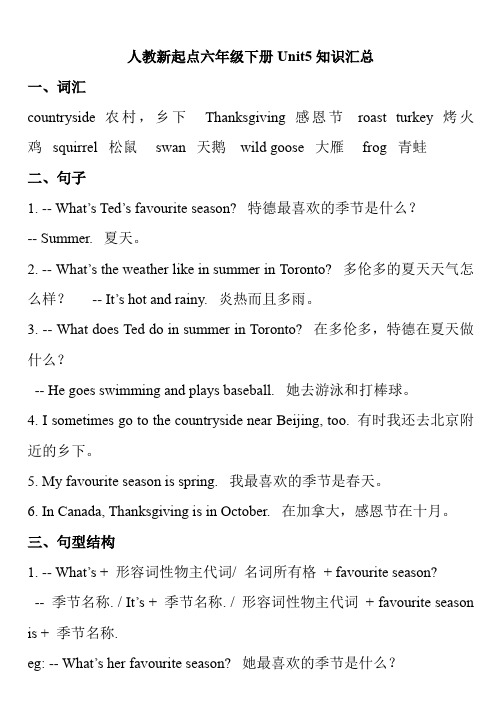
人教新起点六年级下册Unit5知识汇总一、词汇countryside 农村,乡下Thanksgiving 感恩节roast turkey 烤火鸡squirrel 松鼠swan 天鹅wild goose 大雁frog 青蛙二、句子1. -- What’s Ted’s favourite season? 特德最喜欢的季节是什么?-- Summer. 夏天。
2. -- What’s the weather like in summer in Toronto? 多伦多的夏天天气怎么样? -- It’s hot and rainy. 炎热而且多雨。
3. -- What does Ted do in summer in Toronto? 在多伦多,特德在夏天做什么?-- He goes swimming and plays baseball. 她去游泳和打棒球。
4. I sometimes go to the countryside near Beijing, too. 有时我还去北京附近的乡下。
5. My favourite season is spring. 我最喜欢的季节是春天。
6. In Canada, Thanksgiving is in October. 在加拿大,感恩节在十月。
三、句型结构1. -- What’s + 形容词性物主代词/ 名词所有格+ favourite season?--季节名称. / It’s + 季节名称. / 形容词性物主代词+ favourite season is + 季节名称.eg: -- What’s her favourite season? 她最喜欢的季节是什么?-- Her favourite season is spring. 她最喜欢的季节是春天。
2. -- When is + 节日名称?-- It’s on + 日期.eg: -- When is Children’s Day? 儿童节是什么时候?-- It’s on June 1st. 它在六月一日。
人教版英语新起点六下三单元知识点

人教版英语新起点六下三单元知识点English:In the third unit of the New Starting Point Grade 6 English, students will learn vocabulary related to leisure activities, such as "play chess", "do the puzzle", "go camping", and "make a kite". They will also learn present continuous tense to describe what people are doing now, such as "I am playing chess with my friend." In addition, students will practice using the future tense to talk about their plans, such as "I'm going to make a kite this weekend." Furthermore, they will learn to use "what about" to make suggestions, as in "What about playing chess?". Students will also practice using "because" to give reasons, such as "I like camping because I can see the stars." Finally, students will read a passage about a boy's leisure activities and answer questions to demonstrate their reading comprehension.中文翻译:在人教版英语新起点六下的第三单元中,学生将学习与休闲活动相关的词汇,比如“下棋”,“做拼图”,“去露营”和“做风筝”。
新人教版六年级英语下册知识点归纳与整理

新人教版六年级英语下册知识点归纳与整理本文档旨在对新人教版六年级英语下册的知识点进行归纳与整理,以帮助学生更好地掌握课程内容。
单元一:How Do You Spend Your Day?该单元主要介绍日常活动的表达方式,学生需要掌握以下重点知识:- 表示活动的动词短语,如"get up"、"have breakfast"等。
- 询问日常活动的句子结构,如"What do you do in the morning?"等。
- 描述日常活动的句子结构,如"I usually have lunch at 12o'clock."等。
单元二:What's the Weather Like Today?该单元主要介绍天气的表达方式,学生需要掌握以下重点知识:- 表示天气的形容词,如"sunny"、"cloudy"等。
- 询问天气的句子结构,如"What's the weather like today?"等。
- 描述天气的句子结构,如"It's hot and sunny."等。
单元三:At the Zoo该单元主要介绍动物的名称和描述,学生需要掌握以下重点知识:- 常见动物的英文名称,如"elephant"、"tiger"等。
- 描述动物外貌特征的句子结构,如"The elephant has a long trunk."等。
- 提问关于动物的句子结构,如"What does a tiger look like?"等。
单元四:How Many People Are There in Your Family?该单元主要介绍家庭成员的表达方式,学生需要掌握以下重点知识:- 家庭成员的称呼,如"father"、"mother"等。
人教新起点小学六年级英语下册期末考点汇总
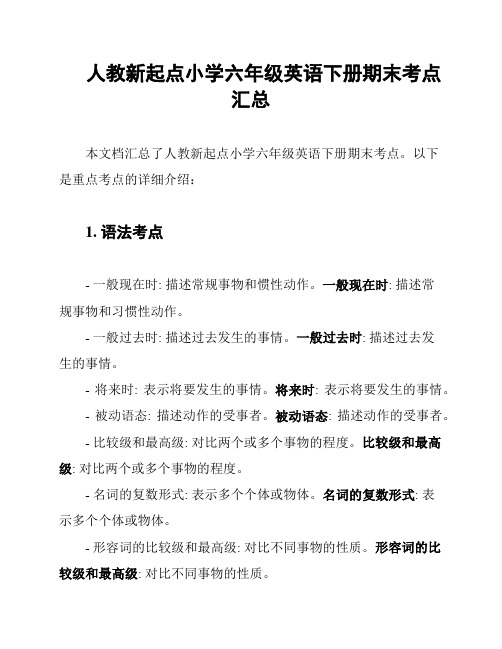
人教新起点小学六年级英语下册期末考点汇总本文档汇总了人教新起点小学六年级英语下册期末考点。
以下是重点考点的详细介绍:1. 语法考点- 一般现在时: 描述常规事物和惯性动作。
一般现在时: 描述常规事物和习惯性动作。
- 一般过去时: 描述过去发生的事情。
一般过去时: 描述过去发生的事情。
- 将来时: 表示将要发生的事情。
将来时: 表示将要发生的事情。
- 被动语态: 描述动作的受事者。
被动语态: 描述动作的受事者。
- 比较级和最高级: 对比两个或多个事物的程度。
比较级和最高级: 对比两个或多个事物的程度。
- 名词的复数形式: 表示多个个体或物体。
名词的复数形式: 表示多个个体或物体。
- 形容词的比较级和最高级: 对比不同事物的性质。
形容词的比较级和最高级: 对比不同事物的性质。
2. 词汇考点- 常用动词: 表示日常活动和动作。
常用动词: 表示日常活动和动作。
- 常用名词: 描述人、物、地点等概念。
常用名词: 描述人、物、地点等概念。
- 常用形容词: 描述事物的性质和特征。
常用形容词: 描述事物的性质和特征。
- 日常生活用语: 包括问候、道谢、购物等。
日常生活用语: 包括问候、道谢、购物等。
3. 句型考点- 问句: 使用特定的疑问词来提问。
问句: 使用特定的疑问词来提问。
- 肯定句: 描述一个事实或陈述一个观点。
肯定句: 描述一个事实或陈述一个观点。
- 否定句: 否定一个事实或观点。
否定句: 否定一个事实或观点。
4. 阅读理解考点- 阅读短文并回答问题。
- 理解文章中的关键信息与细节。
以上是人教新起点小学六年级英语下册期末考点的汇总。
考生们在备考过程中应重点复和掌握这些知识点,以取得更好的成绩。
祝愿大家考试顺利!> 注意:本文档仅为考点汇总,具体考试内容还需以教材和老师要求为准。
人教新起点英语六年级下册各单元重点知识总结
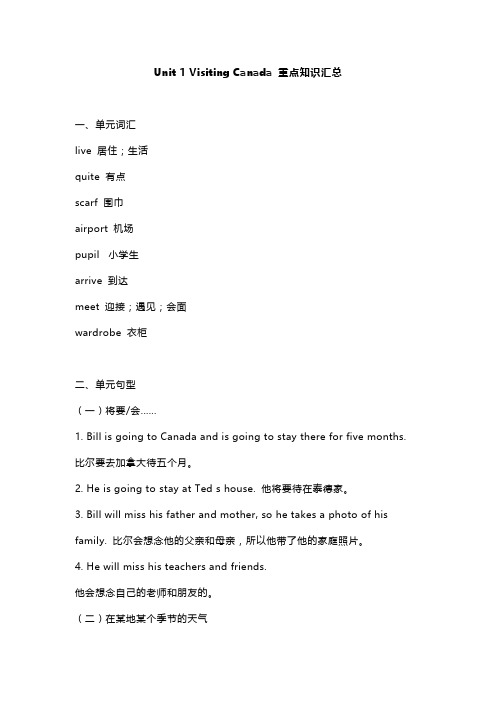
Unit 1 Visiting Canada 重点知识汇总一、单元词汇live 居住;生活quite 有点scarf 围巾airport 机场pupil 小学生arrive 到达meet 迎接;遇见;会面wardrobe 衣柜二、单元句型(一)将要/会......1. Bill is going to Canada and is going to stay there for five months. 比尔要去加拿大待五个月。
2. He is going to stay at Ted s house. 他将要待在泰德家。
3. Bill will miss his father and mother, so he takes a photo of his family. 比尔会想念他的父亲和母亲,所以他带了他的家庭照片。
4. He will miss his teachers and friends.他会想念自己的老师和朋友的。
(二)在某地某个季节的天气It is very cold and snowy in Canada in the winter.在冬天,加拿大是非常寒冷和多雪的。
(三)询问家庭成员1. A: Is this your uncle s family? 这是你叔叔的一家吗?B: Yes. That is my uncle Bob and aunt Lisa.是的。
那是我的舅舅鲍勃和阿姨丽萨。
2. A: Who is that girl? 那个女孩是谁?B: That s Jenny,my cousin. 那是珍妮,我的表妹。
3. A: Who are the people in this photo? 这张照片里的人是谁?B: They are my grandparents. 他们是我的祖父母。
(四)职业1. My uncle is a famous artist. 我的叔叔是一位著名的艺术家。
六年级下册英语全册知识点人教版

六年级下册英语全册知识点人教版篇1Sixth Grade English Book Knowledge PointsUnit 1 Making new friendsIn this unit, students will learn how to introduce themselves and others, ask and answer questions about personal information, talk about hobbies, and make new friends. They will also learn how to describe people’s appearance and personality.Vocabulary:- introduce- neighbor- hobby- personality- appearance- slim- generous- helpfulGrammar:- Singular and plural nouns- Simple present tense- Possessive adjectives- Subject pronounsUnit 2 CommunicationIn this unit, students will learn how to communicate effectively using different types of communication, such as email, telephone calls, and face-to-face conversations. They will also learn how to give and follow directions and ask for help.Vocabulary:- communication- conversation- telephone call- email- message- direction- ask for help- close friendGrammar:- Wh-questions- Imperative sentences- Articles a/an/theUnit 3 A visit to the zooIn this unit, students will learn how to describe animals, talk about their habitats and diets, and discuss conservation efforts. They will also learn how to express their preferences and make comparisons.Vocabulary:- animal- habitat- diet- conservation- prefer- compare- differentGrammar:- Adjectives- Comparative and superlative forms- can/can’tUnit 4 Our school tripIn this unit, students will learn how to describe past events, share their experiences, and talk about their feelings. They will also learn how to use the past simple tense and adverbs of frequency.Vocabulary:- trip- experience- feeling- explore- enjoy- prepare- excitedGrammar:- Past simple tense- Adverbs of frequency- Prepositions of timeUnit 5 Health and fitnessIn this unit, students will learn how to talk about health and fitness, describe symptoms of illness, give advice, and discuss healthy habits. They will also learn how to use modal verbs for advice and suggestions.Vocabulary:- health- fitness- symptom- advice- healthy- habits- restGrammar:- Modal verbs (should/shouldn’t, can/can’t)- Comparative and superlative forms of adjectives- Direct and indirect speechUnit 6 A special invitationIn this unit, students will learn how to respond to invitations, make plans, and organize events. They will also learn how to use future forms of verbs and adverbs of manner.Vocabulary:- invitation- respond- plan- organize- event- future- verbGrammar:- Future forms of verbs (will/shall)- Adverbs of manner- Conditional sentencesBy the end of the sixth grade English book, students will have developed their language skills in speaking, listening, reading, and writing. They will be able to communicate effectively in different situations and confidently express their thoughts and ideas.篇2Sixth Grade English Language Arts Knowledge Points in the People's Education PressThis document will provide an overview of the knowledge points covered in the sixth-grade English language arts curriculum published by the People's Education Press. These knowledge points are designed to help students improve their English language skills and enhance their overall comprehension of the language. By mastering these points, students will bewell-equipped to succeed in their language arts studies and beyond.1. Reading Comprehension: In the sixth-grade curriculum, students will focus on improving their reading comprehension skills. They will learn how to analyze and interpret texts, identify key details, draw inferences, and make connections between different pieces of text. They will also learn how to identify the main idea of a text and summarize passages effectively.2. Vocabulary Building: A strong vocabulary is essential for effective communication in English. Students will expand their vocabulary by learning new words and phrases in various contexts. They will also learn how to use context clues to infer the meaning of unfamiliar words and how to use a dictionary effectively.3. Writing Skills: Writing is an important aspect of the language arts curriculum. Students will learn how to write clear and coherent essays, reports, and narratives. They will also learn how to use proper grammar, punctuation, and spelling in their writing. Additionally, students will learn how to revise and edit their writing to improve clarity and coherence.4. Grammar: A solid understanding of grammar is essential for effective communication in English. Students will learn aboutdifferent parts of speech, sentence structure, verb tenses, and subject-verb agreement. They will also learn how to use pronouns, prepositions, and conjunctions correctly in their writing.5. Speaking and Listening Skills: Effective communication involves both speaking and listening. Students will learn how to speak clearly and confidently in a variety of settings. They will also learn how to listen actively and attentively, ask questions, and engage in discussions with their peers.6. Literary Analysis: Students will learn how to analyze and interpret literary texts, including poems, short stories, and novels. They will learn how to identify literary devices such as symbolism, imagery, and figurative language. They will also learn how to make connections between literature and their own lives.7. Research Skills: Research skills are essential for academic success. Students will learn how to conduct research, gather information from multiple sources, and cite their sources properly. They will also learn how to organize and present their research in a clear and coherent manner.By mastering these knowledge points, students will bewell-prepared to succeed in their sixth-grade English language arts studies and beyond. The People's Education Presscurriculum provides a comprehensive and engaging framework for developing students' language skills and fostering a love of learning.篇3Sixth grade students who are using the People's Education Press textbook for English in the second semester are covering a variety of different topics. This semester focuses on improving students' reading, writing, listening, and speaking skills in English. Here are some key points that students will learn throughout the semester:1. Reading Comprehension:Students will work on understanding and interpreting texts of different genres, such as stories, articles, and poems. They will practice summarizing main ideas, identifying key details, and making inferences based on the text. Students will also learn how to analyze characters, settings, and themes in a text.2. Vocabulary Building:Throughout the semester, students will be introduced to new vocabulary words related to various topics, including daily routines, hobbies, sports, and cultural traditions. They willpractice spelling, pronunciation, and using these new words in sentences to improve their vocabulary skills.3. Grammar and Sentence Structure:Students will review and learn new grammar rules and sentence structures to help them communicate more effectively in English. They will practice using different verb tenses, prepositions, conjunctions, and word order in sentences. Students will also work on improving their writing skills by using proper grammar and punctuation.4. Listening and Speaking:Students will engage in listening exercises to improve their listening comprehension skills. They will listen to dialogues, interviews, and short anecdotes to practice understanding spoken English. In addition, students will have opportunities to participate in group discussions, role-plays, and presentations to improve their speaking skills and confidence in English.5. Writing Skills:Throughout the semester, students will work on improving their writing skills by practicing different types of writing, such as writing narratives, descriptive paragraphs, and opinion essays. They will focus on organizing their ideas coherently, usingproper grammar and vocabulary, and revising their writing for clarity and accuracy.Overall, the sixth grade English textbook for the second semester covers a wide range of topics and skills to help students become more proficient in reading, writing, listening, and speaking in English. By focusing on key language concepts and providing opportunities for practice and reinforcement, students will make significant progress in their English language proficiency.。
新人教版小学英语六年级下册各单元知识点总结

新人教版小学英语六年级下册各单元知识点总结一、单元一:聪明的少年本单元主要学习描述人物特征和能力的形容词,学习一些日常生活用语,并能够正确运用它们进行简单的对话和描述。
1. 形容词:- clever(聪明的)- kind(和善的)- funny(有趣的)- tall(高的)- short(矮的)2. 日常生活用语:- What's your name?(你叫什么名字?)- How old are you?(你多大了?)- Where are you from?(你来自哪里?)- Can you...?(你会...吗?)- Yes, I can. / No, I can't.(是的,我会。
/ 不,我不会。
)二、单元二:宠物乌龟本单元主要学习动物的名称,能够描述宠物乌龟的特征和习性,并能够运用一些日常用语进行简单的对话和表达。
1. 动物名称:- turtle(乌龟)- cat(猫)- dog(狗)- bird(鸟)- fish(鱼)2. 宠物乌龟的特征和习性:- It has a hard shell.(它有一个硬壳。
)- It walks slowly.(它走得很慢。
)- It likes eating vegetables.(它喜欢吃蔬菜。
)三、单元三:假期生活本单元主要学习描述假期活动和地点的名词,学习运用一些简单的句子进行对话和表达自己的假期活动。
1. 假期活动:- go swimming(去游泳)- go hiking(去远足)- visit grandparents(拜访祖父母)- play basketball(打篮球)- watch movies(看电影)2. 地点名词:- park(公园)- beach(海滩)- mountains(山区)- cinema(电影院)- supermarket(超市)四、单元四:神奇的数字本单元主要学习数字的读法和书写,能够描述年龄、规模等具体数字,并进行简单的对话。
人教版六年级下册英语知识点汇总

人教版六年级下册英语知识点汇总一、词汇1. 日常生活与社交•情感与态度词汇:happy, sad, angry, excited, surprised, worried 等。
•社交用语:invite, accept, refuse, apologize, congratulate, thank 等及其相关表达。
•节日与活动:Spring Festival, Mid-Autumn Festival, Christmas, birthday party, sports meeting 等。
2. 学校与学习•学习方法与策略:review, preview, note-taking, brainstorming 等。
•学科相关词汇:geography, history, biology, physics, chemistry(基础词汇)及学科活动。
3. 科技与未来•科技产品:computer, smartphone, internet, robot, AI 等。
•未来设想:space travel, environmental protection, renewable energy 等。
4. 旅行与交通•交通工具:plane, train, bus, subway, ship, bicycle 等。
•旅游景点与活动:museum, zoo, park, beach, hiking, camping 等。
二、语法1. 时态•熟练掌握一般现在时、一般过去时、现在进行时、一般将来时,并初步了解过去进行时和现在完成时的用法。
2. 语态•学习并理解被动语态的基本结构和用法。
3. 非谓语动词•初步接触动词不定式(to do)、动名词(doing)和分词(现在分词doing 和过去分词done)作为非谓语动词的用法。
4. 复合句•学习并列句和主从复合句(如宾语从句、状语从句、定语从句)的基本结构和用法。
三、句型与表达•能够根据语境运用多种句型进行表达,包括疑问句、祈使句、感叹句等。
新人教版小学英语六年级下册各单元知识点总结
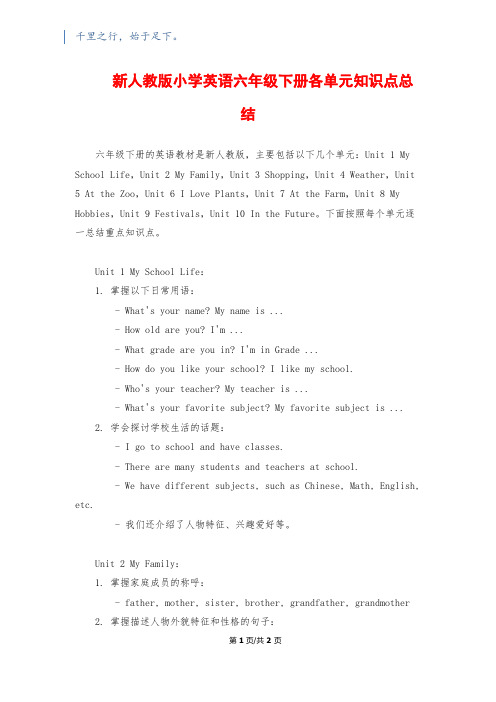
千里之行,始于足下。
新人教版小学英语六年级下册各单元知识点总结六年级下册的英语教材是新人教版,主要包括以下几个单元:Unit 1 My School Life,Unit 2 My Family,Unit 3 Shopping,Unit 4 Weather,Unit 5 At the Zoo,Unit 6 I Love Plants,Unit 7 At the Farm,Unit 8 My Hobbies,Unit 9 Festivals,Unit 10 In the Future。
下面按照每个单元逐一总结重点知识点。
Unit 1 My School Life:1. 掌握以下日常用语:- What's your name? My name is ...- How old are you? I'm ...- What grade are you in? I'm in Grade ...- How do you like your school? I like my school.- Who's your teacher? My teacher is ...- What's your favorite subject? My favorite subject is ...2. 学会探讨学校生活的话题:- I go to school and have classes.- There are many students and teachers at school.- We have different subjects, such as Chinese, Math, English, etc.- 我们还介绍了人物特征、兴趣爱好等。
Unit 2 My Family:1. 掌握家庭成员的称呼:- father, mother, sister, brother, grandfather, grandmother2. 掌握描述人物外貌特征和性格的句子:第1页/共2页锲而不舍,金石可镂。
六年级下册英语重点知识总结人教版
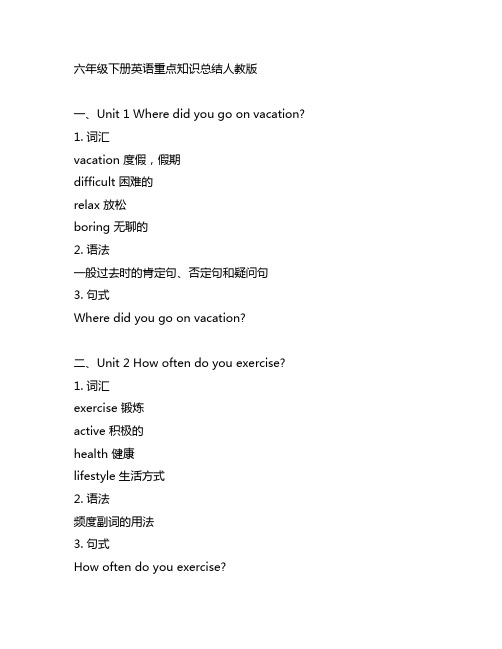
六年级下册英语重点知识总结人教版一、Unit 1 Where did you go on vacation?1. 词汇vacation 度假,假期difficult 困难的relax 放松boring 无聊的2. 语法一般过去时的肯定句、否定句和疑问句3. 句式Where did you go on vacation?二、Unit 2 How often do you exercise?1. 词汇exercise 锻炼active 积极的health 健康lifestyle 生活方式2. 语法频度副词的用法3. 句式How often do you exercise?三、Unit 3 Why do you like koalas?1. 词汇koala 考拉cute 可爱的australia 澳大利亚eucalyptus 树属名2. 语法特殊疑问句的用法3. 句式Why do you like koalas?四、Unit 4 I used to be afraid of the dark.1. 词汇used to 过去常常afraid 害怕的scary 可怕的brave 勇敢的2. 语法used to的用法3. 句式I used to be afraid of the dark.五、Unit 5 Do you want to watch a game show?1. 词汇game show 游戏节目boring 无聊的exciting 令人兴奋的interesting 有趣的2. 语法情态动词的用法3. 句式Do you want to watch a game show?六、Unit 6 I'm going to study computer science.1. 词汇computer science 计算机科学future 未来programmer 程序员opportunity 机会2. 语法be going to的用法3. 句式I'm going to study computer science.七、Unit 7 Will people have robots?1. 词汇robot 机器人human 人类的ungercround 地下的planet 行星2. 语法一般将来时的肯定句、否定句和疑问句3. 句式Will people have robots?八、Unit 8 How do you make a banana milk shake?1. 词汇banana milk shake 香蕉奶昔peel 剥皮knife 刀cup 杯子2. 语法实义动词和不及物动词的用法3. 句式How do you make a banana milk shake?文章开始在六年级下册的英语学习中,我们学习了许多有趣而且实用的知识。
人教版新起点六年级英语下册知识要点汇总

人教版新起点六年级英语下册知识要点汇总Unit 1 Visiting CanadaIn this unit。
we will learn some new words and XXX. Vocabulary:live: to reside or make one's home in a placequite: to some XXX degreescarf: a piece of XXXairport: a place where planes take off and landpupil: a student in primary schoolarrive: XXXXXX: to come into contact with someonewardrobe: a piece of XXXXXX:1.Future plans:Bill is going to Canada and will stay there for five months。
He will stay at Ted's house。
He will miss his family。
so he takes a photo of them。
He will also miss his teachers and friends.2.XXX:Canada is very cold and snowy in the winter.3.Family XXX:Is this your uncle's family。
Yes。
that is my uncle Bob and aunt Lisa.Who is that girl。
That's Jenny。
my cousin.Who are the people in this photo。
They are my grandparents.4.ns:XXX.XXX.XXX.特殊疑问词+一般将来时态结构例如:What are you going to do tomorrow?(你明天打算做什么?)改写:4.XXX。
人教新起点英语六年级下册各单元重点知识总结
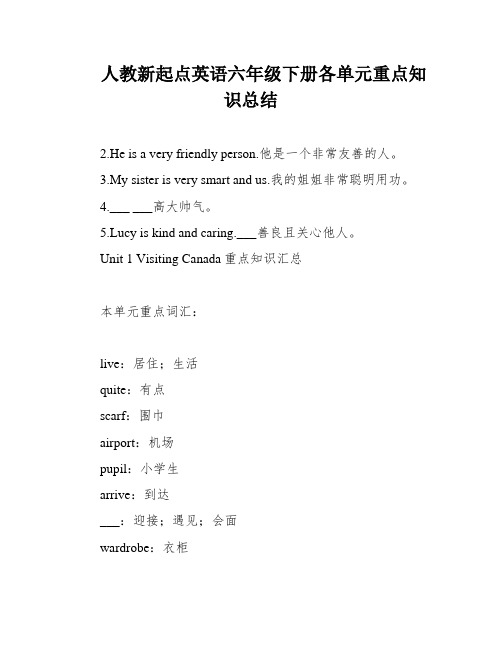
人教新起点英语六年级下册各单元重点知识总结2.He is a very friendly person.他是一个非常友善的人。
3.My sister is very smart and us.我的姐姐非常聪明用功。
4.___ ___高大帅气。
5.Lucy is kind and caring.___善良且关心他人。
Unit 1 Visiting Canada重点知识汇总本单元重点词汇:live:居住;生活quite:有点scarf:围巾airport:机场pupil:小学生arrive:到达___:迎接;遇见;会面wardrobe:衣柜本单元重点句型:一)将要/会……1.___要去加拿大待五个月。
2.他将要待在___家。
3.___会想念他的父亲和母亲,所以他带了他的家庭照片。
4.他会想念自己的老师和朋友。
二)在某地某个季节的天气加拿大冬天非常寒冷和多雪。
三)询问家庭成员1.这是你叔叔的一家吗?是的。
那是我的舅舅___和阿姨___。
2.那个女孩是谁?那是___,我的表妹。
3.这张照片里的人是谁?他们是我的祖父母。
四)职业1.我的叔叔是一位著名的艺术家。
2.我的姑姑是医院里的一个医生。
3.我爷爷也是个艺术家。
4.我的奶奶是个作家。
五)人物特征她十岁。
他是一个非常友善的人。
我的姐姐非常聪明用功。
___高大帅气。
___善良且关心他人。
1.含义:表示过去某一时刻或某一段时间内发生的动作或状态。
2.陈述句结构:①肯定句:主语+动词过去式+其他。
②否定句:主语+ did not +动词原形+其他。
3.一般疑问句结构:Did +主语+动词原形+其他?答语:Yes,主语+ did。
/ No,主语+ didn't.4.特殊疑问句结构:特殊疑问词+ did +主语+动词原形+其他?例如:What did you do yesterday。
昨天你做了什么?三)情态动词1.___:能够,会。
2.could:过去式,曾经能够。
六年级英语下册知识点人教版

六年级英语下册知识点人教版一、语法知识点1. 一般现在时一般现在时表示经常性或习惯性的动作或状态。
句子的谓语动词用原形。
例:- I go to school every day.- She likes playing basketball.2. 现在进行时现在进行时表示现在的动作或事件正在进行中。
句子的谓语动词由"be"动词的相应形式加动词的现在分词构成。
例:- We are watching a movie now.- They are studying for the exam.3. 一般过去时一般过去时表示过去发生的动作或状态。
句子的谓语动词用动词的过去式。
例:- He went to the park yesterday.- We played soccer last weekend.4. 一般将来时一般将来时表示将来要发生的动作或状态。
句子的谓语动词由"will"加动词的原形构成。
例:- I will visit my grandparents next month.- They will have a party on Saturday.5. 现在完成时现在完成时表示过去发生的动作对现在造成的影响或结果。
句子的谓语动词由"have/has"加动词的过去分词构成。
例:- We have finished our homework.- She has learned how to play the piano.二、词汇知识点1. 动词时态动词根据时态的不同形式变化,用以表达不同的时间。
常见的动词时态有一般现在时、现在进行时、一般过去时、一般将来时和现在完成时。
2. 名词复数名词复数表示多个或者一般情况下的数量。
通常在尾部加上"-s"或"-es"来表示复数形式。
例:- cat -> cats- box -> boxes3. 形容词比较级形容词比较级用于比较两个事物的程度、大小、高低等。
人教新起点六年级下册期末知识汇总
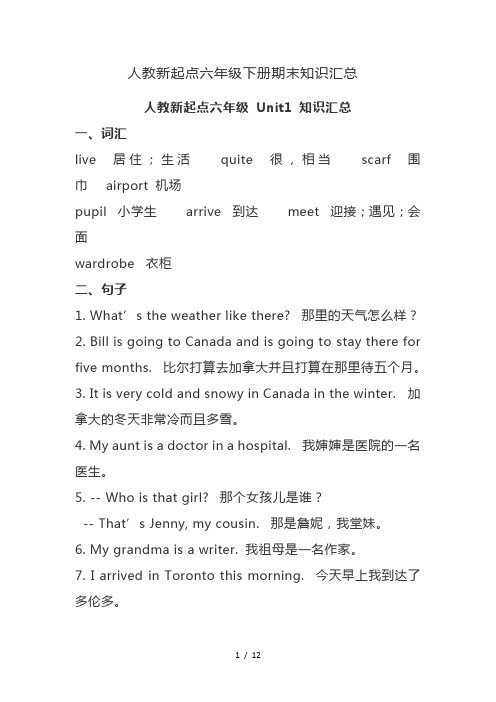
人教新起点六年级下册期末知识汇总人教新起点六年级Unit1 知识汇总一、词汇live 居住;生活 quite 很,相当 scarf 围巾airport 机场pupil 小学生arrive 到达meet 迎接;遇见;会面wardrobe 衣柜二、句子1. What’s the weather like there? 那里的天气怎么样?2. Bill is going to Canada and is going to stay there for five months. 比尔打算去加拿大并且打算在那里待五个月。
3. It is very cold and snowy in Canada in the winter. 加拿大的冬天非常冷而且多雪。
4. My aunt is a doctor in a hospital. 我婶婶是医院的一名医生。
5. -- Who is that girl? 那个女孩儿是谁?-- That’s Jenny, my cousin. 那是詹妮,我堂妹。
6. My grandma is a writer. 我祖母是一名作家。
7. I arrived in Toronto this morning. 今天早上我到达了多伦多。
8. In the room, there is a big wardrobe and a desk. 房间里有一个大衣柜和一个书桌。
三、句型结构1. What’s the weather like + 其他?eg: What’s the weather like in Xi’an? 西安的天气怎么样?2. What does + 主语(第三人称单数)+ do?eg: What does your father do? 你爸爸是做什么的?3. Who is that + 某人?eg: Who is that boy? 那个男孩儿是谁?4. There is a/ an + 某物+ 地点.eg: There is a bank near the Chinese restaurant. 在中餐厅旁边有一个银行。
六年级下英语知识点总结人教版
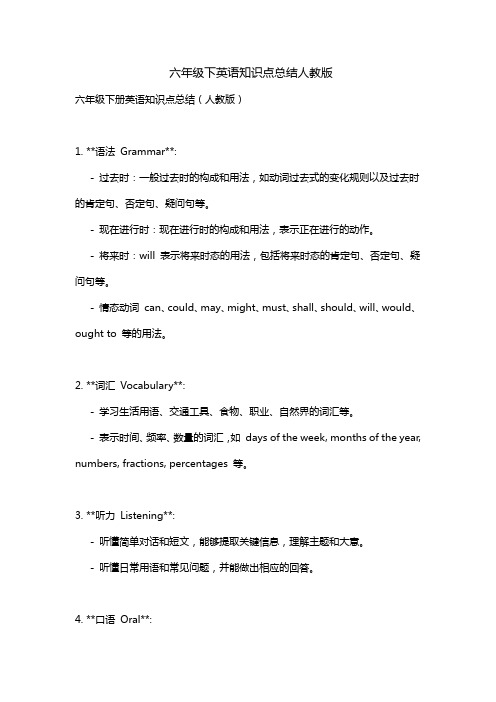
六年级下英语知识点总结人教版六年级下册英语知识点总结(人教版)1. **语法Grammar**:- 过去时:一般过去时的构成和用法,如动词过去式的变化规则以及过去时的肯定句、否定句、疑问句等。
- 现在进行时:现在进行时的构成和用法,表示正在进行的动作。
- 将来时:will 表示将来时态的用法,包括将来时态的肯定句、否定句、疑问句等。
- 情态动词can、could、may、might、must、shall、should、will、would、ought to 等的用法。
2. **词汇Vocabulary**:- 学习生活用语、交通工具、食物、职业、自然界的词汇等。
- 表示时间、频率、数量的词汇,如days of the week, months of the year, numbers, fractions, percentages 等。
3. **听力Listening**:- 听懂简单对话和短文,能够提取关键信息,理解主题和大意。
- 听懂日常用语和常见问题,并能做出相应的回答。
4. **口语Oral**:- 运用所学语言进行日常交流,能够介绍自己、询问他人信息、描述事物等。
- 参与简单的对话和小组讨论,表达自己的看法和意见。
5. **阅读Reading**:- 阅读简单的故事、短文或说明文,理解主要内容和关键信息。
- 掌握一定的阅读技巧,如根据上下文推断词义、理解文中主题句等。
6. **写作Writing**:- 能够书写简单的句子、短文或日记,表达个人观点和情感。
- 根据题目要求,完成一定长度的书面作文,包括叙事、描写、说明、议论等。
7. **文化常识Cultural Knowledge**:- 了解英语国家的文化习俗、传统节日等,如圣诞节、万圣节、感恩节等。
- 了解一些英语国家的地理、历史和风土人情。
这些是六年级下册英语课程的主要知识点总结,希望能对你有所帮助!。
人教新起点英语六年级下册知识点汇总

人教新起点英语六年级下册知识点汇总Unit 1 Visiting Canada(访问加拿大)一、单元词汇live 居住;生活quite 有点scarf 围巾airport 机场pupil 小学生arrive 到达meet 迎接;遇见;会面wardrobe 衣柜二、单元句型(一)将要/会......1. Bill is going to Canada and is going to stay there for five months. 比尔要去加拿大待五个月。
2. He is going to stay at Ted s house. 他将要待在泰德家。
3. Bill will miss his father and mother, so he takes a photo of his family. 比尔会想念他的父亲和母亲,所以他带了他的家庭照片。
4. He will miss his teachers and friends.他会想念自己的老师和朋友的。
(二)在某地某个季节的天气It is very cold and snowy in Canada in the winter.在冬天,加拿大是非常寒冷和多雪的。
(三)询问家庭成员1. A: Is this your uncle s family? 这是你叔叔的一家吗?B: Yes. That is my uncle Bob and aunt Lisa.是的。
那是我的舅舅鲍勃和阿姨丽萨。
2. A: Who is that girl? 那个女孩是谁?B: That s Jenny,my cousin. 那是珍妮,我的表妹。
3. A: Who are the people in this photo? 这张照片里的人是谁?B: They are my grandparents. 他们是我的祖父母。
(四)职业1. My uncle is a famous artist. 我的叔叔是一位著名的艺术家。
统编版新起点6年级英语下册知识要点汇总

人教版新起点六年级英语下册知识要点汇总Unit 1 Visiting Canada一、单元词汇(千里之行,始于单词哦!)live 居住;生活 quite 有点scarf 围巾 airport 机场pupil 小学生 arrive 到达meet 迎接;遇见;会面 wardrobe 衣柜二、单元句型(学会了这些句子,会变得更加优秀哦!)(一)将要/会......1. Bill is going to Canada and is going to stay there for five months. 比尔要去加拿大待五个月。
2. He is going to stay at Ted's house. 他将要待在泰德家。
3. Bill will miss his father and mother, so he takes a photo of his family. 比尔会想念他的父亲和母亲,所以他带了他的家庭照片。
4. He will miss his teachers and friends.他会想念自己的老师和朋友的。
(二)在某地某个季节的天气It is very cold and snowy in Canada in the winter.在冬天,加拿大是非常寒冷和多雪的。
(三)询问家庭成员1. A: Is this your uncle's family? 这是你叔叔的一家吗?B: Yes. That is my uncle Bob and aunt Lisa.是的。
那是我的舅舅鲍勃和阿姨丽萨。
2. A: Who is that girl? 那个女孩是谁?B: That's Jenny,my cousin. 那是珍妮,我的表妹。
3. A: Who are the people in this photo? 这张照片里的人是谁?B: They are my grandparents. 他们是我的祖父母。
- 1、下载文档前请自行甄别文档内容的完整性,平台不提供额外的编辑、内容补充、找答案等附加服务。
- 2、"仅部分预览"的文档,不可在线预览部分如存在完整性等问题,可反馈申请退款(可完整预览的文档不适用该条件!)。
- 3、如文档侵犯您的权益,请联系客服反馈,我们会尽快为您处理(人工客服工作时间:9:00-18:30)。
人教新起点六年级下册知识点汇总Unit 1 Visiting Canada(访问加拿大)一、单元词汇(千里之行,始于单词哦!)live 居住;生活quite 有点scarf 围巾airport 机场pupil 小学生arrive 到达meet 迎接;遇见;会面wardrobe 衣柜二、单元句型(学会了这些句子,会变得更加优秀哦!)(一)将要/会......1. Bill is going to Canada and is going to stay there for five months.比尔要去加拿大待五个月。
2. He is going to stay at Ted's house. 他将要待在泰德家。
3. Bill will miss his father and mother, so he takes a photo of his family. 比尔会想念他的父亲和母亲,所以他带了他的家庭照片。
4. He will miss his teachers and friends.他会想念自己的老师和朋友的。
(二)在某地某个季节的天气It is very cold and snowy in Canada in the winter.在冬天,加拿大是非常寒冷和多雪的。
(三)询问家庭成员1.A: Is this your uncle's family? 这是你叔叔的一家吗?B: Yes. That is my uncle Bob and aunt Lisa.是的。
那是我的舅舅鲍勃和阿姨丽萨。
2.A: Who is that girl? 那个女孩是谁?B: That's Jenny,my cousin. 那是珍妮,我的表妹。
3.A: Who are the people in this photo? 这张照片里的人是谁?B: They are my grandparents. 他们是我的祖父母。
(四)职业1. My uncle is a famous artist. 我的叔叔是一位著名的艺术家。
2. My aunt is a doctor in a hospital. 我的姑姑是医院里的一个医生。
3. My grandpa is an artist, too. 我爷爷也是个艺术家。
4. My grandma is a writer. 我的奶奶是个作家。
(五)人物特征1. She is ten years old. 她十岁。
2. She's good at singing, dancing and drawing.她擅长唱歌,跳舞和画画。
3. He is very funny. 他很有趣。
4. She is very kind and friendly. 她很友善。
5. She is very pretty. 她很漂亮。
(六)过去发生的事1. I arrived in Toronto this morning. 我今天早上到达多伦多。
2. Ted and his dad met me at the airport.泰德和他的爸爸在机场接我。
3. Ted showed me my room. 泰德向我展示了我的房间。
4. In the evening, they held a welcome party for me.在晚上,他们为我举行了欢迎聚会。
5. She invited me to her birthday party next month.她邀请我下个月去她的生日派对。
(七)那里有......In the room,there is a big wardrobe and a desk.在房间里有一个大衣柜和一张桌子。
(八)心情1.He is very excited. 他非常兴奋。
2.Bill also feels quite sad. 比尔也觉得相当难过。
3.I'm happy to be here, but I miss you.我很高兴来到这里,但我想念你们。
三、语法知识(掌握了这些知识点,阅读写作so easy!)(一)一般将来时态1. 含义:表示将来某一时刻的动作或状态。
将来某一段时间内经常的动作或状态。
2. 陈述句结构:①肯定句:主语+ be going to /will + 动词原形+ 其他.②否定句:主语+ be not going to /will not +动词原形+ 其他.3. 一般疑问句结构:Will +主语+ 动词原形+ 其他?Be +主语+ going to + 动词原形+ 其他?答语:Yes, 主语+ will. / No, 主语+ won't.4. 特殊疑问句结构:特殊疑问词+ will + 主语+ 动词原形+ 其他?特殊疑问词+ be + 主语+ going to + 动词原形+ 其他?(二)一般过去时态1. 含义:过去某个时间里发生的动作或状态。
过去习惯性、经常性的动作或行为。
过去主语所具备的能力和性格。
2. 时间标志词:yesterday, last week...3. 陈述句结构:肯定形式:主语+ 动词过去式+ 其他.否定形式:主语+ didn't + 动词原形+ 其他.Unit 2 All Around Me(我的周围)一、单元词汇(千里之行,始于单词哦!)show... around 带领……参观Queen's Park 女王公园art gallery 艺术馆public library 公共图书馆downtown 闹市区;市中心Lake Ontario 安大略湖stadium (露天)体育场二、单元句型(学会了这些句子,会变得更加优秀哦!)(一)位置Next to the bookshop is a cinema, and there is a bank next to the cinema. 书店旁边是一个电影院,电影院旁边有一个银行。
Across from the cinema there is a library.电影院对面有一个图书馆。
The CN Tower is near the stadium. CN 塔在体育场的旁边。
It's near the park, next to the subway station.它离公园很近,在地铁站的旁边。
(二)那儿有......There are many beautiful buildings in downtown Toronto.在多伦多市中心有许多美丽的建筑物。
There are a lot of shops on this street. 这条街上有很多商店。
There is a big lake in Toronto called Lake Ontario.有一个大的湖在多伦多叫做安大略湖。
There is a famous restaurant next to the stadium.体育场旁边有一家很有名的餐厅。
(三)科目My favourite class is PE. 我最喜欢的课是体育课。
We study English and maths every day.我们每天学习英语和数学。
We have PE class on Tuesday and Thursday afternoons.我们的体育课在星期二和星期四的下午。
I study art on Wednesday and Thursday.星期三和星期四我学习美术。
(四)过去发生的事Today was my first day at Willow Primary School.今天是我在柳树小学的第一天。
Ted showed me around the school. 泰德带我参观学校。
We met Ted's friend Tony. 我们遇到了泰德的朋友托尼。
I also met my new teacher, Miss Jackson.我还见到了我的新老师,杰克逊小姐。
(五)人物特征Tony is short but handsome. 托尼很矮但是很英俊。
She is young and pretty. 她年轻漂亮。
She has curly black hair and wears glasses.她有黑色的卷发,戴着眼镜。
She was very nice to me. 她对我很好。
Sherry is very tall and active. 雪莉非常高和活泼。
She plays basketball very well. 她篮球打得很好。
三、语法知识(掌握了这些知识点,阅读写作so easy!)There be 句型1. 含义:那里有......2. 结构:①There is + a/an + 可数名词单数+ 其他.②There is + 不可数名词+ 其他.③There are + ( 大于1 的基数词) + 可数名词复数+ 其他.④There are + 限定词+ 可数名词复数+ 其他.限定词:形容词,大于1 的基数词等Unit 3 Daily Life(日常生活)一、单元词汇(千里之行,始于单词哦!)volunteer 志愿者sandwich 三明治top 上边,上面habit 习惯idea 主意,想法;意见less 更少at least 至少二、单元句型(学会了这些句子,会变得更加优秀哦!)(一)周末生活1. A: Bill, what do you do on weekends in China?比尔,你在中国周末做什么?B: On Saturday mornings, I always go to my maths club.周六早上,我通常去数学社团。
B: On Saturday afternoons, I often stay at home and do my homework. 周六下午,我经常在家做作业。
B: Sometimes I go shopping or go to the cinema with my mum. 有时我去购物或者和妈妈一起看电影。
B: Wow, you're so busy on weekends! 哇,你周末好忙!(二)保持健康的建议What should we do to keep healthy? What are your ideas?我们应该怎样保持健康呢?你们有什么想法?We shouldn't eat them every day. 我们不该每天吃它们。
We should eat more fruit and vegetables, and less meat and candy.我们应该吃更多水果和蔬菜,少吃肉和糖。
